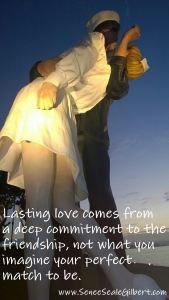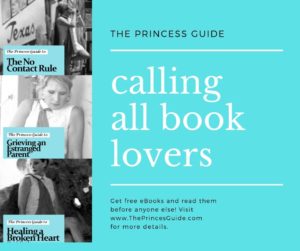In 2018, I was listening to a very successful entrepreneur taking questions from audience members at one of his talks. When he asked a woman if she had considered getting a business partner who had more experience in business than she did, her response was, “I have trust issues!” Can you relate? I admired her self-awareness and honesty.

Often, people who have been in toxic relationships find it hard to trust. Repeated times of trusting people who have proven to be less than trustworthy make it hard to believe in others or even ourselves.
There was a time in my life when I would mourn the loss of a person or opportunity for a long time while thinking that my life was over and nothing good would come to replace that perceived loss. I had trust issues.
The Urban Dictionary defines trust issues as, “When a person has trouble trusting others due to betrayal or other personal reasons … Trust issues cause a lot of issues in future events and can cause disappointment and missing out on important situations in life.”
I absolutely agree. Some people say trust is earned. Others say trust is freely given and up to the other person to lose. Either way, if you’re self-aware enough to know that you have them, it’s up to you to deal with them by doing the internal work.
Healing begins with forgiveness
Healing trust issues begins with an f-word — forgiveness. You literally have to f- it … forgive it. In order to trust anyone again, you will need to forgive — yourself and all those who have hurt or mistreated you.
“Forgiveness is a powerful friend … It simply means to drop the charges,” wrote Mark T. Barclay in his book, How to Survive a Betrayal. “To forgive is to put it in God’s hands, and not seek personal vengeance. If you don’t forgive, you will become bitter, hurting only yourself.”
Webster Illustrated Contemporary Dictionary defines forgiveness as, “the act of forgiving — to grant pardon for or remission of (something); to cease to blame or feel resentment against.” You have to stop blaming yourself for your mistakes or for trusting untrustworthy people. You have to stop blaming other people for the wrongs they have done to you. I’m not in any way suggesting that you excuse the behavior or allow it to continue. I’m simply saying that you show grace and give space for the other person to change their behavior — even if that means that you physically separate yourself from them while wishing them well and sending them good thoughts.
You’ll often hear that you have to forgive and forget. I believe forgetting is a mistake that leads to being mistreated again. However, I’ve found that over time, when you become healthier, you let go of the pain and forget much of the wrongs that have been done to you. “You must find a way to forgive. ‘Forget’ will come even harder and much slower. Even so, for your own sake, you must deal with this deep wound,” Barclay wrote.
Practice gratitude
It’s my opinion that at the core of trust issues is rejection. When a person doesn’t keep their word to us or mistreats us, that isn’t just disappointing — it becomes a form of rejection. We often think of rejection as being a negative thing, but by changing the way we look at rejection, we can change our whole outlook and trust again.
Back in 2018 when I was looking over my life, I allowed myself to feel the love and joy in particular moments in my existence and was grateful that I was honored to experience them. I also looked at the deep, deep rejection I’ve felt from people. I realized that if they had not rejected me, I would have been in a miserable position, at the very least. In some cases, it could have cost me my life.
It’s taken a lot of internal work, but I’m so grateful that I can see that the rejection I thought would kill me was actually protection from something much worse — jobs, people, situations … you name it. It becomes much easier to look at rejection through this lens.
No matter what you have encountered, just know that you were made for great things. You have seeds of greatness within you … Let them out. Also, trust yourself and that small voice inside you (your intuition) to guide you into making better choices. Like my best friend’s friend said, “If it don’t feel right, it ain’t right.” Allow people to show you who they really are through their words and behaviors. If they prove to be something you don’t want in your life, trust that feeling.
Trust yourself, then others
In her book, The Language of Letting Go, Melody Beattie said the key to trusting others is to trust yourself first. “The most important trust issue we face is learning to trust ourselves. The most detrimental thing that’s happened to us is that we came to believe we couldn’t trust ourselves,” she explained.
I know from experience and observation that relationships are one continual cycle of messing up, fessing up and forgiving. We must be willing and prepared to ask for forgiveness and grant forgiveness — to ourselves and others.
Psychology Today offered these expert tips on how to trust others again:
- Give it time. Over a period of time, your trust can be rebuilt with repeated positive experiences … when a [person] consistently demonstrates [his or her] reliability, despite your more critical evaluation of [his or her] actions, [he or she] might earn your trust.
- Acknowledge and evaluate. To trust a partner again, betrayal must be acknowledged. The wrongdoer must admit that he or she has inflicted a deep hurt and the victim must look at what he or she could have done to make things different.
- Look for the good. Trust yourself to stop damning people as a whole, no matter how badly they now behave. Then, you may help them to become more trustworthy.
- Go inside. The way back to trust is counterintuitive: The issue is whether we can trust ourselves to make wise decisions.
Beattie agrees, “Self-trust is a healing gift we can give ourselves. How do we acquire it? We learn it. What do we do about our mistakes, about those times we thought we could trust ourselves but were wrong? We accept them, and trust ourselves anyway.
“Trust ourselves, and we will know whom to trust. Trust ourselves, and we will know what to do. When we feel we absolutely cannot trust ourselves, trust that God will guide us into truth,” she explained.
I have an older attorney friend who has told me over the years, “Trust but verify.” That means giving people the opportunity to prove they are who they say they are and back up their words and promises with positive actions
Set boundaries, but stay open
I’ve been talking a lot lately about boundary setting and being open. Like I said in a video on dating, every castle has a wall around it, but make sure there is also a gate in it to allow the right person inside. We can’t punish every person for the misdoings of another. That’s like you being put in prison because someone across the country you don’t even know committed a crime. It’s wrong. So, don’t do it. It isn’t just unfair to the other person, but it’s also unfair to you — There are wonderful people out there that you deserve to experience great events with. Don’t rob yourself of that.
I spent some time writing about trust in my book The Princess Guide to Healing a Broken Heart because it’s a big issue for many people. Since publishing that book, I’ve thought a lot about something — After your broken heart has healed, how do you know if it’s safe to let someone (new or old) into your life? How do you know if you can trust the person who broke your heart?
Now, I know a lot of people will say you can never trust someone who hurt you. You most definitely need to exhibit caution in these circumstances, but I don’t believe you should write someone off altogether. Again, I will say, give grace and space for a person to change their behavior and make things right. If they choose not to do so, that is your answer. Move on. People can change … It doesn’t happen often, but it does happen.
Your job is to set appropriate boundaries and be open to allowing the right people into your life who prove they are trustworthy through consistently backing up their words with actions. Just like I say about how loving yourself first will equip you to love others well, by practicing trusting yourself first, you will know who to trust.
Do you have a question about life that you want Senée to answer? Leave it in the comments or email it to PrincessGuide@BecomingPublishing.com.
Senée Seale is a book author, mental health professional and life guide passionate about helping people create positive changes in their lives. Are you ready to start attracting positive things into your life through practicing daily affirmations? Get your free copy of The Princes Guide to Gratitude Affirmations. If you’d like to work directly with Senée, she’s accepting new clients.





